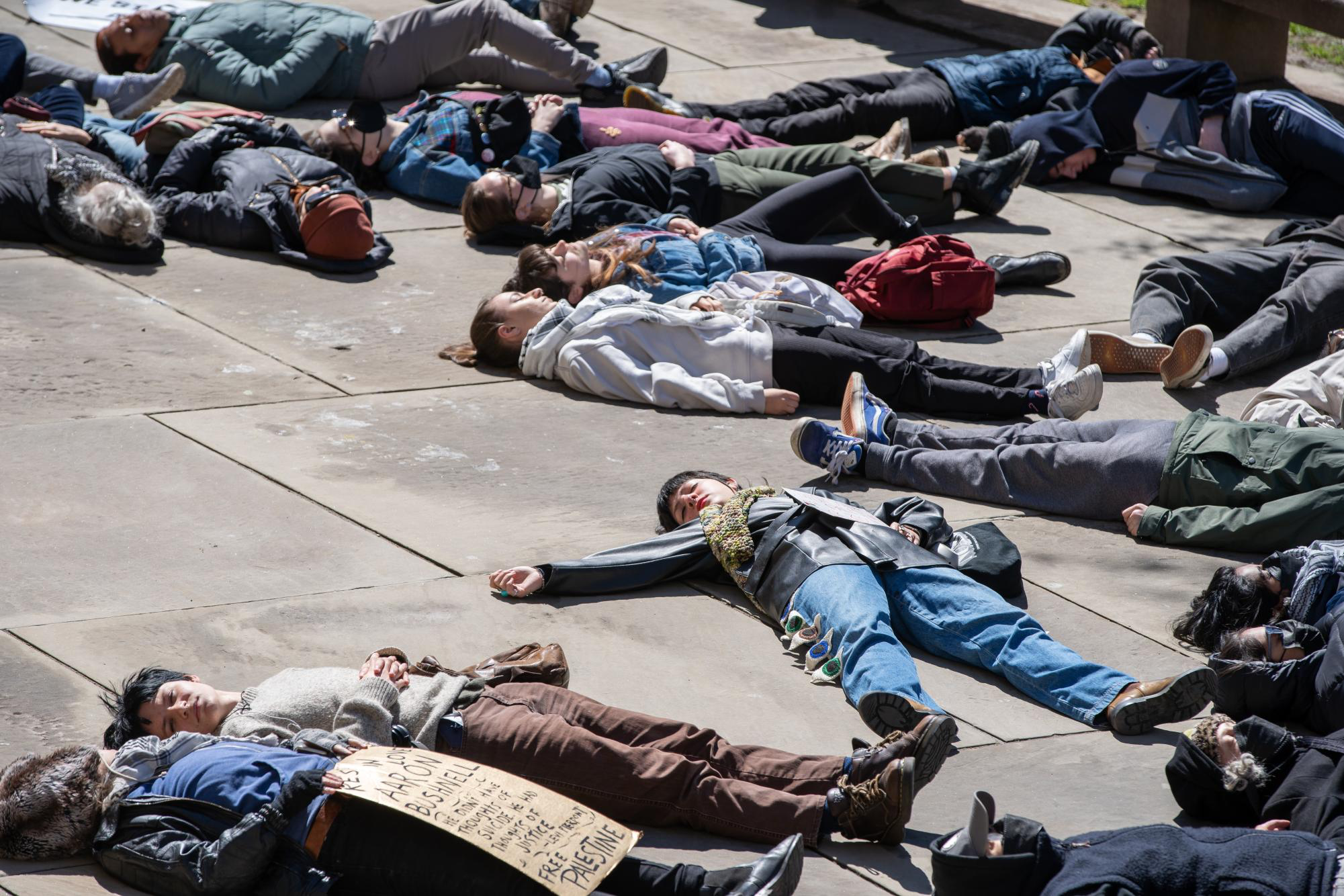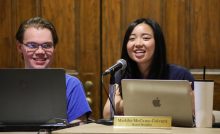One-year commemoration of Hamas attacks prompts reflection from student organizations


Protesters participate in a die-in in front of the Cathedral of Learning at an event hosted by Pittsburgh Palestine Coalition.
Following the first attack on Israel by militant group Hamas on Oct. 7 of last year, members of the Pitt campus community, as well as those from other local universities, have responded with protests and encampments on Pitt’s campus that have been met with mixed reactions from the community.
Daniel Marcus, chief executive officer of Pitt’s chapter of Hillel Jewish University Center, said he believes protests and encampments in response to the Israel-Hamas war have had a “hugely negative effect” on the well-being of Jewish students.
“These things do not aid the student environment of collegiality, of friendship,” Marcus said. “All it does is [cause] division, anxiety and fear for Jewish students, and it’s wholly unacceptable.”
Marcus said Hillel JUC at Pitt views slogans like the ones heard at on-campus protests as harmful for the Jewish community.
“They have been painful. They have created an environment of anxiety and often fear,” Marcus said. “What we hear at the encampments and protests are slogans like ‘Globalize the Intifada’ [and] ‘from the river to the sea.’ Our interpretation is that it’s calling for violence against Jews, not only in Israel but throughout the world.”
Students for Justice in Palestine at Pitt said that the organization believes on-campus protests have been imperative when it comes to raising awareness about the Israel-Hamas war.
“Campus protests have undeniably played a critical role in educating students and galvanizing action around the cause of Palestinian liberation, especially in spaces where the topic has historically been sidelined or suppressed,” SJP said in a statement. “Through teach-ins, rallies and public discussions, students have not only been exposed to the realities of the Israeli occupation but are also empowered to take direct action, such as organizing divestment campaigns, pressuring administration and building solidarity networks.”
SJP at Pitt believes the University’s response to protests and encampments on campus is responsible for detriments to students mental and physical health, rather than the demonstrations themselves.
“Students who witnessed or experienced this violence firsthand have been forced to reconcile the reality that their institutions, which may preach values of care and inclusion, are willing to use coercion and force to silence dissent,” SJP said. “Protests and encampments are spaces of empowerment, education and solidarity where students come together to raise awareness and take collective action on issues of injustice. However, it is the University’s punitive reaction — deploying police to arrest, intimidate and physically harm students, as well as subjecting them to sham disciplinary hearings — that inflicts real harm.”
According to SJP at Pitt, responses from administration to protests on campus have solidified its beliefs about the University’s position in divesting from Israel.
“The University’s response to these protests has only sharpened the contradictions between its claims to prioritize student well-being and its role in upholding systems of repression,” SJP said. “While the administration claims to value discourse and students’ mental and physical health, it simultaneously invites police onto campuses to repress the movement for Palestinian liberation, leading to the physical and psychological harm of the very students it claims to protect.”
For Marcus and many of the students he works with on campus, the response to conflicts abroad from pro-Palestinian groups on campus is counterintuitive.
“Hearing those slogans, hearing that hate, can only be psychologically and, as we’ve seen in recent weeks, physically detrimental for Jewish students on the Pitt campus,” Marcus said. “We don’t interpret this as anything toward peace, because that’s not the behaviors, the language and the attitudes that we’ve been facing.”
In light of current political and humanitarian conflicts escalating within the past year, Hillel JUC continues to provide a supportive space for Jewish students on campus. Marcus said while Hillel works with the Pitt Police department to ensure the safety of all students, its main focus is to provide care and coterie to its students.
“We provide education, care, support and community for our students to gather and be together when these things are happening and and also before, during and after,” Marcus said. “We’re very fortunate to have great support from the University Police Department, and we hugely appreciate their care, but our role is to be in community with Jewish students, to provide support, education and an opportunity to be together.”
SJP at Pitt said they are focused on “fostering a supportive environment” for Palestinian, Arab and other POC students, which includes “creating safe spaces for discussion, healing and community-building.”
“We are committed to raising awareness about the realities of the situation in Palestine by hosting poetry nights, film screenings and panels featuring speakers who can provide insights into historical and contemporary Palestine,” SJP said. “Finally, we remain steadfast in our demands for disclosure of and divestment from investments in companies and institutions that profit from Israeli apartheid, genocide and occupation in Palestine.”
Marcus said regardless of the state of the world, Hillel JUC is there to support Jewish college students.
“What we’re always focused on is to engage Jewish students, to provide them with community and allow them to celebrate their Jewish identity with pride, however they interpret that,” Marcus said.
Timeline of Israel-Palestine events on campus since Oct. 7, 2023
Oct. 10, 2023: Hillel JUC and Chabad student organizations on campus hosted a peace rally in Schenley Plaza in support of Israel. Palestinian protesters later organized a counter-protest in support of Palestine, with both groups peacefully protesting into the late evening.
Nov. 7, 2023: The Jewish Federation of Greater Pittsburgh set up a display of empty Shabbat tables in Schenley Plaza to honor Israeli hostages in Gaza.
Nov. 10, 2023: Around 200 people participate in a walkout entitled “Shut it Down for Palestine,” featuring speakers at Carnegie Mellon University’s “Walking to the Sky” statue. The event was condemned by the University, who stated the rally was “not approved to take place on [their] campus.”
Jan. 16: Students and community members gathered outside the William Pitt Union to support hostages taken during Hamas’s initial attack on Israel on Oct. 7, 100 days after the event.
Jan. 16: Protesters gathered in Schenley Plaza in a “Hands off Yemen” protest to protest United States airstrikes on Yemen.
April 1: Supporters of Palestine marched from the Islamic Center of Pittsburgh to Schenley Plaza in front of the Carnegie Library in a protest sponsored by Christian organization FOSNA Pittsburgh, where attendees were able to visit a tent exhibition focused on Palestinian culture and history.
April 2: Around 60 people participated in a die-in protest, hosted by Pittsburgh Palestine Coalition, outside the Cathedral of Learning near Bigelow Boulevard to demand an “immediate ceasefire in Gaza.”
April 23: Students held a sit-in protest in the Cathedral of Learning, forming a “liberation zone” in support of Palestinians. The group was later asked by Pitt administration to move outside the Cathedral, where they set up an encampment for a few hours before being redirected to Schenley Plaza for the night. On Day 2 of the encampment, Cornell West visited Schenley Plaza to speak with students and community members. The encampment continued until Monday, April 27, and two students were arrested with charges of defiant trespassing.
April 29: Pro-Palestinian protests gathered at the Cathedral of Learning and William Pitt Union to march for Palestine in continuation of the sit-in protest that began on April 23. Protesters called for Pitt to divest funds supporting Israel.
June 2: Pro-Palestinian protesters re-established a Palestinian solidarity encampment on the Cathedral lawn to send a “clear message” to University administration. Campus, city and state police formed a barricade around the perimeter of the encampment, and at least one person was arrested. The encampment continued overnight with increased police presence. Chancellor Joan Gabel issued a statement calling for a “peaceful resolution.”
June 4: Hillel JUC and other Jewish organizations condemned Palestinian encampment protests, which called for the termination of Pitt’s chapter of Hillel and the Student Coalition for Israel at Pitt.
Sept. 4: Students for Justice in Palestine held the first pro-Palestine protest of the 2024-2025 academic year, with around 70 students and community members gathering to recognize 300 days of conflict in Gaza.
Sept. 26: Pro-Lebanon and Palestine groups organized an “emergency rally” in front of the Cathedral of Learning to call for the protection of Lebanon with violence between Israel and Hazbollah rising.
Oct. 4: A group of around 250 students, alumni and community members marched in solidarity with Lebanon and Palestine, beginning at the Carnegie Museum of Art and ending at the intersection of Fifth Avenue and Bigelow Boulevard.
Recent Posts
SGB introduces new governing code bill and addresses rumors of ICE on campus
At its weekly meeting at Nordy’s Place on Tuesday, Student Government Board introduced an omnibus…
Opinion | School should be in the summer
Although this may be controversial, I believe that from this data, it is evident that…
Weathering the storm: Pittsburgh teams have tackled some of the toughest environments
The end of the year in western Pennsylvania is always marked by two things —…
Notes From an Average Girl // Notes on Book Banning
In this edition of Notes From an Average Girl, senior staff writer Madeline Milchman writes…
To Be Honest // Yup, it is that damn phone
In this edition of To Be Honest, staff writer Evin Verbrugge writes about her phone…
Meaning at the Movies | Portraying Toxic ‘Adolescence’
In this edition of Meaning at the Movies, staff writer Lauren Deaton explores the mini-series…

